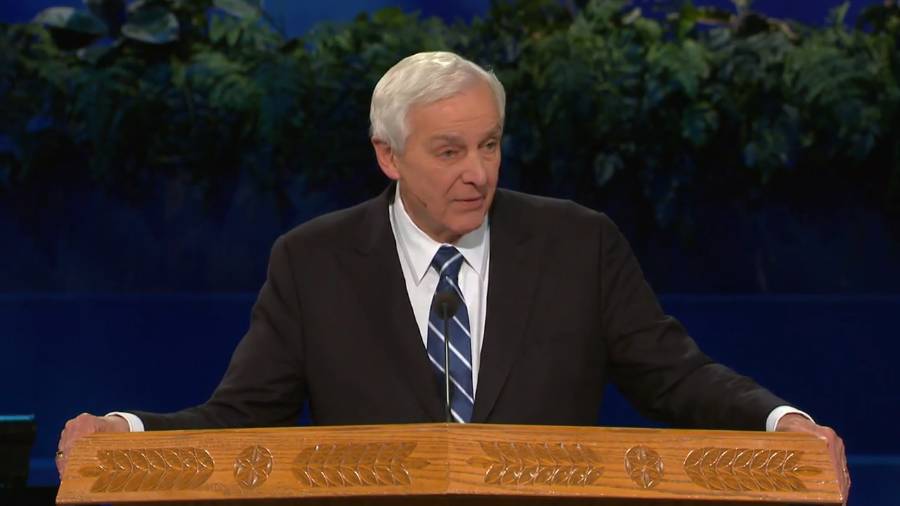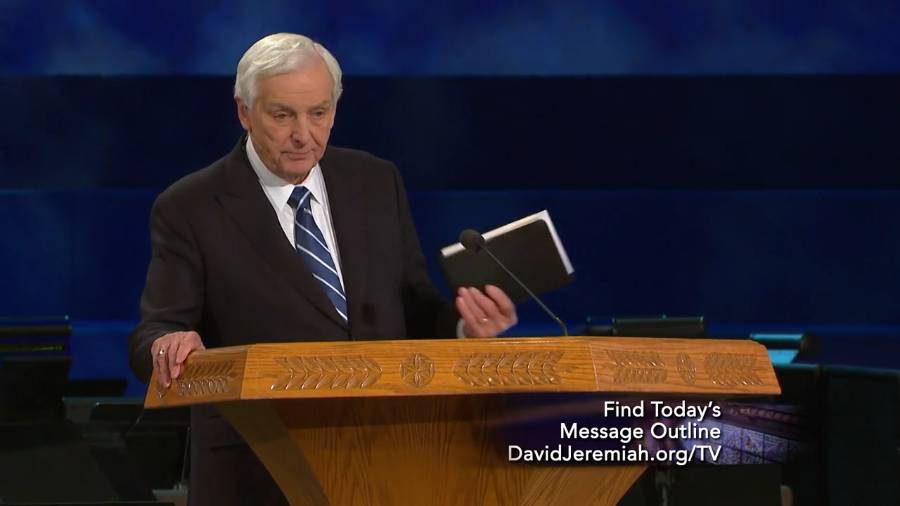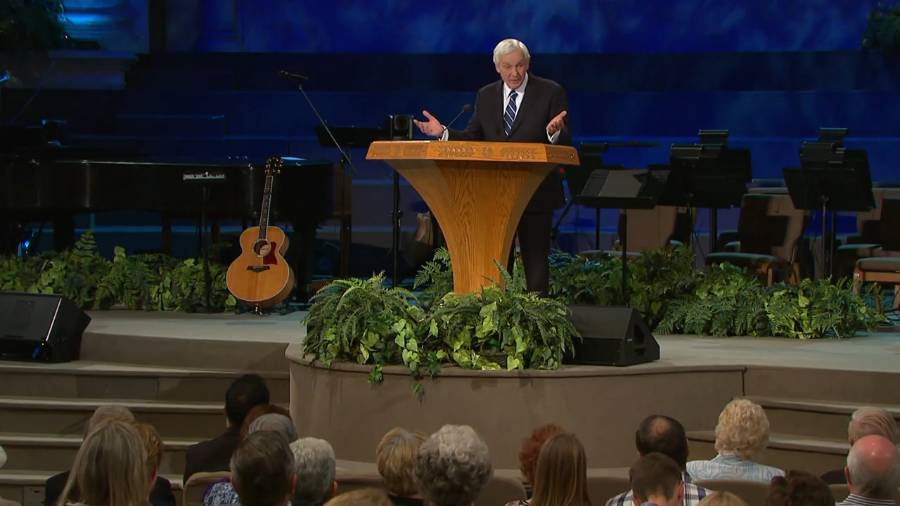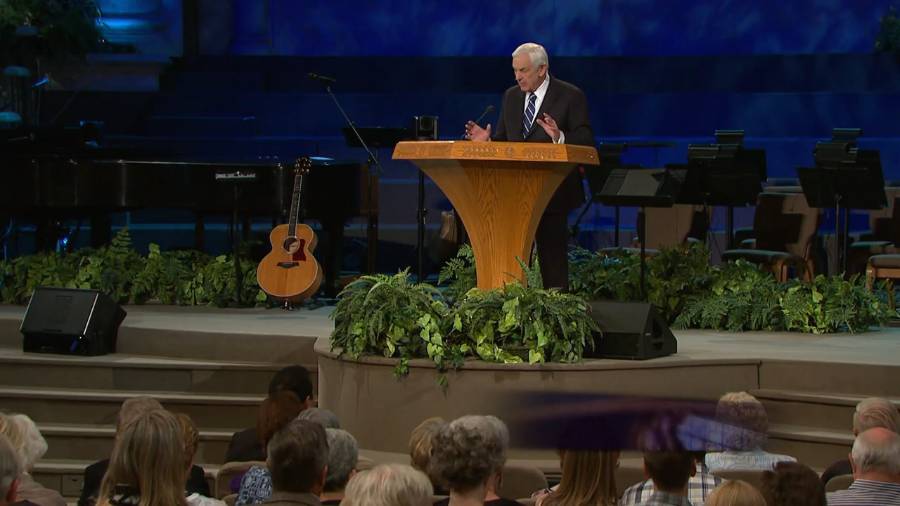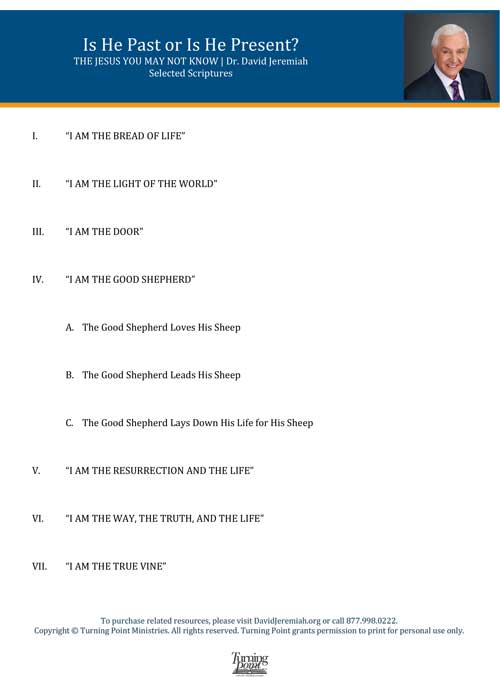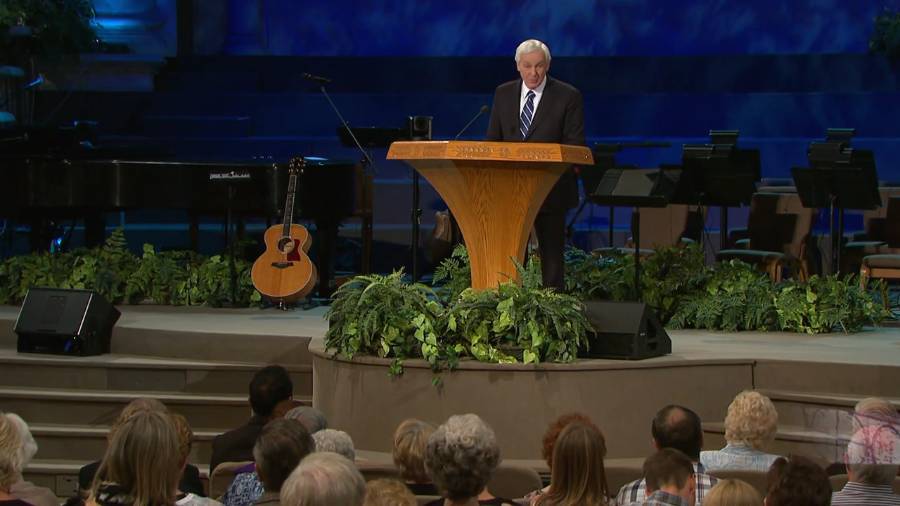The Jesus You May Not Know
Learn toFathomJesus like never before
Resources from David Jeremiah to aid in your journey from knowing about Jesus to knowing Jesus.
Is He Past or Is He Present?
Thanks for downloading your free resource!
Thanks for downloading your free resource!

Jesus Only: A Motto for Life
By David Jeremiah
Perhaps you know the hymn, “The Solid Rock,” which begins with these words of testimony: “My hope is built on nothing less than Jesus’ blood and righteousness.” The original title of this 1836 song was “The Immutable Basis of a Sinner’s Hopes.” Edward Mote, the author, was born in a poor home in Upper Thames Street, London, in early 1797. His parents weren’t churchgoers or Bible believers; but when Mote was a teenager, he heard a sermon by Reverend John Hyatt at Tottenham Court Road Chapel and was brought under conviction of sin. Two years later he was converted. He eventually became a skilled carpenter and a lay pastor in the village of Horsham, south of London.
“One morning,” he recalled, “it came into my mind as I went to labor to write a hymn on the ‘Gracious Experience of a Christian.’ As I went up to Holborn I had the chorus: On Christ the solid Rock I stand, all other ground is sinking sand. In the day I had four first verses complete, and wrote them off.
“On the Sabbath following, I met brother King… who informed me that his wife was very ill, and asked me to call and see her. I had an early tea and called afterwards. He said that it was his usual custom to sing a hymn, read a portion, and engage in prayer before he went to meeting. He looked for his hymnbook but could find it nowhere. I said, ‘I have some verses in my pocket; if he liked, we would sing them.’ We did, and his wife enjoyed them so much that after service he asked me, as a favor, to leave a copy of them for his wife.
“I went home, and by the fireside composed the last two verses, wrote the whole off, and took them to sister King… As these verses so met the dying woman’s case, my attention to them was the more arrested, and I had a thousand printed for distribution.” It quickly became a popular and beloved hymn across England and beyond.
Years later, when Mote himself was dying, he told his friends, “I think I am going to heaven; yes, I am nearing port. The truths I have been preaching, I am now living upon and they’ll do very well to die upon. Ah! The precious blood.”
What Must a Person Do to Be Saved?
“The Solid Rock” emphasizes one of the foundational truths of the Christian faith: Our salvation is based on Christ alone.
The Bible says, “Not by works of righteousness which we have done, but according to His mercy He saved us, through the washing of regeneration and renewing of the Holy Spirit” (Titus 3:5).
This is the great legacy of the New Testament theologians. When the Gospel of Christ leaped over the boundaries of Israel and Judaism, a central question arose. Is salvation for the Gentiles too? And, if so, do these Gentiles need to become Jewish proselytes? Do they need to conform to Jewish law? Do they need to be circumcised? Do they need to adopt the Jewish calendar of Feast Days? Must they acquiesce to Jewish dietary requirements? A great council was convened in Acts 15 to discuss these matters. The central question was: “What must a person do to be saved?” The apostles and church leaders defied efforts to impose legalism and ritualism on these new believers, affirming for all time that salvation is totally by grace through faith in Christ alone.1
The apostle Paul became the great champion of justification by grace through faith, stating his case in plain English—well, Greek—in Ephesians 2:8–9: “For by grace you have been saved through faith, and that not of yourselves; it is the gift of God, not of works, lest anyone should boast.”
When Judaizing false teachers followed behind him, threatening to muddle the message and disrupt his churches, Paul responded with holy intensity. Writing to the Galatians, he declared:
I marvel that you are turning away so soon from Him who called you in the grace of Christ, to a different gospel, which is not another; but there are some who trouble you and want to pervert the gospel of Christ. But even if we, or an angel from heaven, preach any other gospel to you than what we have preached to you, let him be accursed (Galatians 1:6–8).
He charged the Galatians to return wholeheartedly to the truth “that a man is not justified by the works of the law but by faith in Jesus Christ…by faith in Christ and not by the works of the law; for by the works of the law no flesh shall be justified” (Galatians 2:16).
He told the Romans, “We conclude that a man is justified by faith apart from the deeds of the law” (Romans 3:28).
During subsequent centuries of the church, some again fell away from the simple teaching of justification by grace. Then the reformers, men like John Wycliffe, John Huss, and Martin Luther rediscovered the timeless truth of Scripture Alone, Grace Alone, and Faith Alone, the preaching of which brought about a revival of evangelism in the church.
Are You Going to Heaven?
The world is filled with religions that want to add or take away from the simple plan of salvation.
How easy to add works, to add rules, to add fear. How dangerous to subtract repentance, to subtract judgment, to subtract the all–sufficient blood of Christ.
Perhaps you don’t think this is an issue for you or in your church. Many of us, if asked, would affirm that Jesus + 0 = salvation. But walk outside your church and stand on the sidewalk. Take a little stroll down your street or through your apartment complex. Stop people at random and ask them if they think they are going to heaven. Many of them will say, “I hope so.” If you ask them the basis for their hope, they’ll likely say, “I’m trying to live a good life. I’m trying to do more good things than bad. I’m trying to be a good person.”
Even churchgoing people often think they are saved by being baptized, attending services, volunteering, partaking of the Lord’s Supper, or engaging in some religious ritual or another. But as the old–time preachers used to say, “Being in church doesn’t save you any more than being in a garage makes you a car or being in a doghouse makes you a dog.”
Our testimony is: “I dare not trust the sweetest frame, but wholly lean on Jesus’ Name.” We do good works not in order to be saved but because we are saved. We add our love and service to Him because of what He has done for us, not because of what we hope He will do for us.
All the work necessary for our salvation was finished in 1930.
No, I’m not talking about a year but a biblical text. Maybe 1930 can be a mnemonic to help you remember John 19:30 and our Lord’s declaration on the cross: “It is finished!” All that would ever be needed for our salvation was now finished. We can rest on the finished work of Christ.
The Bible says, “For all have sinned and fall short of the glory of God, being justified freely by His grace through the redemption that is in Christ Jesus” (Romans 3:23–24).
Jesus Will Always Be Enough
On the Mount of Transfiguration, the disciples looked up and “saw no one but Jesus only” (Matthew 17:8). Commenting on this verse, the British preacher Charles Spurgeon said that the words “Jesus only” should be our motto in life, our hope in death, and our joy in heaven. “Jesus is enough for time and eternity,” said Spurgeon.2
And enough is enough! He is all we need. As the cabinetmaker turned preacher turned hymnist, Edward Mote, put it:
My hope is built on nothing less
Than Jesus’ blood and righteousness.
I dare not trust the sweetest frame,
But wholly lean on Jesus’ Name.
His oath, His covenant His blood,
Support me in the whelming flood.
When all around my soul gives way,
He then is all my Hope and Stay.
On Christ the Solid Rock I stand,
All other ground is sinking sand,
All other ground is sinking sand.
This article is adapted from the September 2011 issue of Turning Points Magazine and Devotional, a ministry of Turning Point with Dr. David Jeremiah. Request your complimentary subscription today.
1John MacArthur, The MacArthur Study Bible (Nashville: Thomas Nelson, 2006), Acts 15.
2C. H. Spurgeon, “Jesus Only,” The Spurgeon Archive: Metropolitan Tabernacle Pulpit, Sermon No. 924, April 3, 1870.






